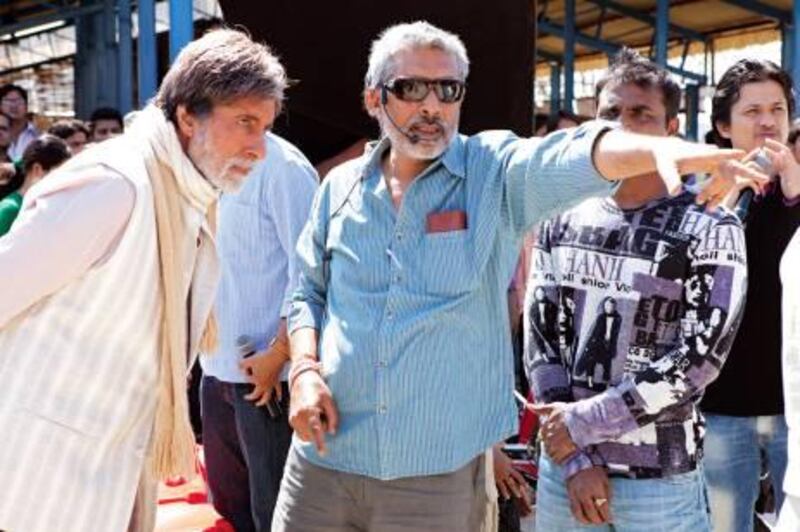DUBAI // A Bollywood film that has stirred concern in India for its focus on a controversial government policy has also touched a chord among Indians in the UAE before its premiere next month.
The film, Aarakshan (Reservation) has reignited a volatile debate in India about the long-running policy of the same name - one that reserves college seats and government jobs for India's poorest segments.
MORE UAE NEWS: Our pick of today's top local news stories
Facebook Ramadan insult earns Briton Dh3,000 fine Woman called her female colleague a dictator and a bin Laden follower, a Dubai court has been told. Read article
Doctor suspended in Dubai on murder charge has job in Al Ain Intensive-care chief on trial for murder is working in hospital. Read article
Dubai Police investigate possible hacking of their tweets Police investigate possibility that someone within the force, or a former employee, is making unauthorised and malicious use of their account. Read article
[ MORE UAE NEWS ]
For Indians in the UAE, it draws attention to the issue of limited university seats available to students seeking to return home. Stiff competition and tough entrance examinations, coupled with places reserved for marginalised communities such as the lower castes and tribes, make it difficult for students to earn college places.
Responding to criticism the film will merely inflame simmering debate, the director, Prakash Jha, has appealed to people to reserve judgement until they have watched it.
"I am calmly telling everybody to wait for the film because it is a story that every family, every child has to deal with - it is their present and their future," Jha said.
"Aarakshan is here to stay, it will not go away from society. We can understand it better and try to mitigate the pain on every side. This is an issue that cannot be swept under the carpet. My point of view is to create better harmony."
Set for UAE release on August 11, the film centres on the Indian government's policy and the rifts between friends in a university, where the legendary Indian actor Amitabh Bachchan plays the role of the college principal.
The film explores the tension between Bachchan, his daughter, played by Deepika Padukone, and the actor Saif Ali Khan, who portrays a brilliant student from the Dalit community. Members of the community were once known as the "untouchables" and were considered to be the lowest rang of India's social hierarchy.
Strikes have disrupted work in Indian colleges and hospitals over the past two decades with clashes between those who favour jobs and places being earned on merit and others who insist quotas are vital in ending social inequalities.
The quota in state-funded professional colleges is 49.5 per cent for lower castes, or the economically disadvantaged section, thus impacting the choice of Indian colleges for UAE students.
"It can be a challenge for students, especially if they don't have a very high grade," said Rema Menon, the founding director of Counselling Point, a Dubai-based organisation that advises students. "Students from here [UAE] are not aware of the extent of reservation so it's a rude shock when they get back."
She said a student recently almost did not secure admission to a university in Chennai.
"One of my students who went to India for a B.Com degree programme with 93.6 per cent was initially not accepted," Ms Menon said. "The reservation categories had to be allocated first. She finally got in the university's third list."
The film will appeal to expat Indians, said Ritesh Matlani, 22, who was born in Dubai and studied here.
"I would definitely watch it, not because I have suffered, but just because it's such a contemporary issue," said Mr Matlani, who works at a Dubai publishing firm.
"My generation really appreciates such films because there are very few films from Bollywood that hit a chord emotionally."
Protests in India have been building up ahead of the film's release. Citing the "sensitive issue of reservation", the Scheduled Caste/Scheduled Tribe Commission has asked to watch the movie before its commercial release.
Jha and Bachchan were last week denied permission to meet students to promote the movie in northern India's Lucknow University on the grounds that it could "vitiate the varsity's education atmosphere". The meeting has since been shifted to a private college and more talks are planned in colleges across India.
Critics believe Jha has a winner owing to his track record of eight national awards and last three hits Gangajal, Apaharan and Rajneeti.
"He [Jha] makes films that he believes in," said Vajir Singh, a trade analyst and editor of Box Office India magazine, which is published in Mumbai. "The subject of quota is not normally what filmmakers would attempt or what people would want to watch. But that has happened before with his films, everyone thought, 'who will watch it?' and he has always proved everyone wrong."







